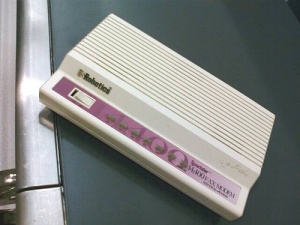Choose Your Own IP
by in Feature Articles on 2009-10-29
After firing up a terminal session, some troubleshooting revealed the culprit.

After firing up a terminal session, some troubleshooting revealed the culprit.
 It was 1999, and Brian's company's new online marketing venture was finally off the ground and making a profit using an off-the-shelf conglomeration of bits and pieces of various content management, affiliate program, and ad servers. Brian's team had hit all of the goals for the first funding tranche, and the next step was to use those millions of dollars to grow the staff from twelve to fifty, half of whom would be software developers working directly for Brian.
It was 1999, and Brian's company's new online marketing venture was finally off the ground and making a profit using an off-the-shelf conglomeration of bits and pieces of various content management, affiliate program, and ad servers. Brian's team had hit all of the goals for the first funding tranche, and the next step was to use those millions of dollars to grow the staff from twelve to fifty, half of whom would be software developers working directly for Brian.
The project was an $8 million, nine-month development effort to build, from the ground up, the best 21st-century marketing/e-commerce/community/ad network/reporting system mousetrap possible. Leading a team of twenty people was a big step up for Brian, so he buckled down, read management theory books, re-read The Mythical Man Month, learned the ins-and-outs of project management software, invested in UML and process training, and carefully pored over resumes to find the best candidates.
The Fully Automated Manual System was originally published on September 22, 2006
 It was to be the perfect system: requested by an IT-friendly internal client, managed by a competent project manager, described by insightful business analysts, designed by an experienced architect, built by intelligent programmers, and perfected by thorough testers. Its goal was hefty but noble: replace the current manual billing system with a fully automated process that tracks jobs, hours, accounting, and payroll. It was to save employees across the organization a lot of time and save the company a lot of money by bringing payroll processing in-house. But alas, it was confronted by an obstacle it just could not overcome: the Chief Technology Officer.
It was to be the perfect system: requested by an IT-friendly internal client, managed by a competent project manager, described by insightful business analysts, designed by an experienced architect, built by intelligent programmers, and perfected by thorough testers. Its goal was hefty but noble: replace the current manual billing system with a fully automated process that tracks jobs, hours, accounting, and payroll. It was to save employees across the organization a lot of time and save the company a lot of money by bringing payroll processing in-house. But alas, it was confronted by an obstacle it just could not overcome: the Chief Technology Officer.
Back in the late 1990's, Lyfe R worked as a tech support manager for CompuMart (as I'll call them), which was the largest retailer of consumer PC's in the region. They had a store in almost every town and used world-class marketing along with an extremely aggressive sales team to sell at extremely low prices. I mean, surprisingly low; as in, lowest-bidder low. Because the salespeople were rather "generous" with claims of what their low-end computers could do, the cost of support eventually became greater than the sales margin, and the whole company collapsed. But it sure was fun while it lasted.
A customer was having a problem with some recent software he purchased: it required Windows 98, yet he only had Windows 95. The first-line technicians started out with a simple reboot, then a reboot with a "two minute wait" before turning on. The tech then moved on to a complete factor-state restore using the restore CD. The logic behind that was apparently to "refresh the installer executable". When that didn't work, the first-line tech suggested that the customer buy a Windows 98 upgrade at his local CompuMart store.
 It was nearly impossible to find an available and fully-functioning PC in the large campus labs at West Thomson-Friedman University. It's not like the student lab administrators were lazy. Oh no, in fact the clueless-users-who-were-far-too-dangerous-for-their-own-good and the malicious-users-who-were-far-too-bored-for-their-own-good made the student admins really earn their minimum wage.
It was nearly impossible to find an available and fully-functioning PC in the large campus labs at West Thomson-Friedman University. It's not like the student lab administrators were lazy. Oh no, in fact the clueless-users-who-were-far-too-dangerous-for-their-own-good and the malicious-users-who-were-far-too-bored-for-their-own-good made the student admins really earn their minimum wage.
This dog's breakfast was tough to swallow for any serious users of the labs, and even more so for the poor CompSci students who just wanted to test their programming assignment before it was due. So in response to their students' pleas, the powers-that-be set up special labs in the CompSci building. These machines were configured with more RAM, more hard drive space, and bigger monitors than their utilitarian counterparts in the large labs. Since the computers had special software installed just for the CompSci students, getting access to the labs was controlled by a key card. If a CompSci student needed a card, all he needed to do was go down to the dungeon basement in the main admin buildings and pay a $10 deposit to get a card.
The job listing seemed pretty normal — small-but-rapidly-growing software company needs top-notch developers to help expand flagship product — but there was one little detail that seemed a little... off. Near the bottom of the ad, it read note that we do not make custom-made software. David didn't think much of it at the time, especially since the company's website also reiterated that same point. He figured it must have been some sort of industry thing.
David sent in his résumé and was fortunate enough to get an in-person interview with Frank, the company's CEO. The receptionist smiled and replied in a perky voice, "great! I'll let Frank know; just take a seat and he should be here soon."
 Michael L. felt the buzz of his phone go off. He ignored it.
Michael L. felt the buzz of his phone go off. He ignored it.
Seconds later, he felt a hand on his shoulder.
Symbolic Installation was originally published on August 16, 2006.
 Mark Mooney works in a fairly standard internal application development environment. His group writes code, packages it up, and sends it off the Infrastructure Group for deployment to the QA servers. Like many organizations, Mark's group has virtually no access to these servers. If they're lucky, they can use the application as an end-user would. If they're really lucky, they can directly access the server log files.
Mark Mooney works in a fairly standard internal application development environment. His group writes code, packages it up, and sends it off the Infrastructure Group for deployment to the QA servers. Like many organizations, Mark's group has virtually no access to these servers. If they're lucky, they can use the application as an end-user would. If they're really lucky, they can directly access the server log files.
Please show your support for The Daily WTF by checking out the companies that have been kind enough to sponsor us. And, in doing so, I’m sure you’ll find some pretty cool products and services built by like-minded developers and IT professionals.
The Daily WTF Sponsors
Backstop Solutions - if you're in Chicago (or would consider relocating), and are a Java Developer or Software TesterBreaker, then Backstop is certainly worth checking out. They build web-apps with an Agile approach, embrace open-source solutions, and work with the latest technology whenever they can. And they're hiring!Square Space - a fully hosted, completely managed environment for creating and maintaining your website. I took advantage of the no-hassle fee trial and was pretty impressed with the UI and ease of creating websites; it's got some developer support as well, if needed. MaxESP - Elastic Shared Platform, the first highly available Microsoft ASP.NET shared web hosting platform, designed to cater to all aspects of the application life cycle. Introductory accounts are available in October FREE of charge for 30 days and just $49 a month after that. InformIT - if you read tech books, then you're probably already familiar with InformIT. They publish all sorts of different books and occasionally give away free eBooks, like this one. Software Verification - software engineering tools for memory leak detection, code coverage, performance profiling, thread lock contention analysis and thread deadlock detection, flow tracing and application replay on the Windows Vista, 2003, XP, 2000 and NT platforms. Atlassian - the folks behind JIRA (which, in turn inspired Manual JIRA) wanted to let you know that they're not a "follow the rules" software company who realizes that there is no single recipe for practicing agile development. They were once hungry for practical tips, so they thought they should share their agile story. SoftLayer - serious hosting provider with datacenters in three cities (Dallas, Seattle, DC) that has plans designed to scale from a single, dedicated server to your own virtual data center (complete with racks and all) SlickEdit - makers of that very-impressive code editor and some pretty neat Eclipse and VisualStudio.NET tools and add-ins, some of which (Gadgets) are free. Check out this short video highlighting just one of SlickEdit's Visual Studio integration features.
It was his first job, so Kenneth couldn't really complain. His official title was Senior System Administrator and, in his role, he was responsible for such glamorous things like setting up new desktops and cleaning spyware off the administrative assistant's PC. The people were nice, they appreciated the work he did, and the commute was fine. But whenever payday would come around, he'd be reminded that he was doing entry-level work for entry-level pay, all with a big-boy title. Not too long after he started, it was time for a change.
When Kenneth tendered his resignation, his boss was legitimately happy for him and glad that he was moving up in his career. As a parting tasked, he asked Kenneth to train John, the soon-to-be Senior System Administrator, on all of their systems. As it turned out, it was John's first job, too.